Established in 2000, the FMA Fellows Program recognizes individuals who have made significant contributions to the profession such as distinguished scholarship as evidenced by someone's contributions to the literature throughout his/her career or supervising PhD students, writing books, editing journals, or through work with professional associations like FMA.
Scholarly contributions are a necessary condition to be a Fellow. The Fellows Selection Committee also considers significant service to the profession when considering nominees for this honor.
Franklin Allen is the Co-Director, Wharton Financial Institutions Center and Nippon Life Professor of Finance and Economics at the University of Pennsylvania. Dr Allen has held the following positions at Wharton: Nippon Life Professor of Finance (1994); Vice Dean and Director, Doctoral Programs (1990-93); Associate Director, Doctoral Programs (1988-90); and, Co-Director, Financial Institutions Center (2000-present). His visiting appointments have included University of Oxford; University of Tokyo; University of Frankfurt; and Princeton University as well as adjunct appointments at New York University. He received the Class of 1984 Teaching Award, 1996, 1997; Helen Kardon Moss Anvil Award, 1993, 1999; Excellence in Teaching Award (Graduate Division), 1990, 1993, 1996, 1997, 1998, 1999, 2000, 2001; Miller-Sherrerd MBA Core Teaching Award, 1992, 1993, 1996, 1997, 1999, 2000, 2001; Undergraduate Division Excellence in Teaching Award, 1991; and the Lindback Award for Distinguished Teaching, 2001. He has served as President, American Finance Association (2000); President, Western Finance Association (1998-99); President-Elect, American Finance Association (1998-99); President, Society for Financial Studies (1997-99); and Associate Editor, Financial Management, (1991-present).
Edward I. Altman is the Max L. Heine Professor of Finance at the New York University Stern School of Business. He is the Vice-Director of the NYU Salomon Center for Research in Financial Institutions and Markets, and since 1990 has headed the research effort in fixed income and credit markets at the center. Professor Altman has been with Stern for more than a decade. Prior to serving in his present position, Professor Altman chaired the Stern School's MBA Program. His primary areas of research include bankruptcy analysis and prediction, credit and lending policies, risk management in banking, corporate finance and capital markets. He has been a consultant to several government agencies, major financial and accounting institutions and industrial companies and has lectured to executives in North America, South America, Europe, Australia-New Zealand, Asia and Africa. He has testified before the U.S. Congress, the New York State Senate and several other government and regulatory organizations and is a Director and a member of the Advisory Board of a number of corporate, publishing, academic and financial institutions.
Victor L. ("Vic") Andrews is an alumnus of the College, the Department of Economics, and the Graduate School of Business of the University of Chicago. His doctoral degree in Economics was received from MIT in 1958. Dr. Andrews served on the faculties of the Sloan School of Management of MIT, the Harvard Business School, and for 25 years chaired the department of finance of the College of Business Administration of Georgia State University. Simultaneously with the Chairmanship, Dr. Andrews was the Mills Bee Lane Professor of Banking and Finance. In 1993, he became Professor Emeritus and Chairman Emeritus in the Georgia University System. He organized and chaired the CFO Round Table of the Department of Finance of Georgia State University from 1993 to the present.
Dr. Andrews has worked extensively as a consultant and witness in securities litigation, corporate valuation, utility economics, and other matters before courts and regulatory authorities in state, provincial, and federal levels in the United States and Canada. He taught in executive programs in-house for many different companies, and was a member of the faculties of several executive-level banking schools. He continues his long membership on the Board of Directors of the INVESCO family of mutual funds. Dr. Andrews was one of the founding members of the Financial Management Association. He was the Founding Editor, 1971- 1976, of Financial Management, President of the Association for 1978-1979, and Trustee for several years. Dr. Andrews continues his consulting practice and executive teaching through Andrews Financial Associates, Inc. He and his wife, Elaine, reside on Skidaway Island, off the coast of Savannah, Georgia.
Brad Barber is the Gallagher Professor of Finance at the Graduate School of Management, UC Davis.
Dr. Barber has been recognized as one of the most widely cited financial economists in the world (ranking 38th in one citation survey). He was elected as FMA President and served in 2018. He currently serves on the advisory boards of the Academic Female Finance Finance Committee (AFFECT) and the Principles of Responsible Investment (PRI). He was a Principal Investigator for the CalPERS Sustainable Research Initiative (SIRI, 2012-2016) and the finance department editor for Management Science (2009-2012). He is the founder of the Napa Finance Conference.
Dr. Barber's research focuses on asset pricing, behavioral finance, and private equity. He has written numerous scholarly articles, which have appeared in top academic publications including the Journal of Finance, Journal of Financial Economics, Review of Financial Studies, Journal of Political Economy, Quarterly Journal of Economics, American Sociological Review, Journal of Financial and Quantitative Analysis, and the Financial Analyst Journal. His research has been covered extensively in the financial press, including Business Week, Time, The Wall Street Journal, ABC News, NBC Nightly News, CNN, CNNfn, and CNBC.
Dr. Berk's research is primarily theoretical in nature and covers a broad range of topics in finance, including delegated money management; the pricing of financial assets; valuing a firm’s growth potential; the capital structure decision; and the interaction between labor markets and financial markets. He has also explored individual rationality in an experimental setting. He has coauthored two finance textbooks: Corporate Finance and Fundamentals in Finance. The first edition of Corporate Finance is a very successful first edition textbook in financial economics, and is a standard text in almost all top MBA programs around the world. At the GSB, he teaches courses in Institutional Money Management and Critical Analytical Thinking. His research is internationally recognized and has won numerous awards, including the TIAA-CREF Paul A. Samuelson Award, the Smith Breeden Prize, Best Paper of the Year in the Review of Financial Studies, and the FAME Research Prize. His article, “A Critique of Size-Related Anomalies,” was selected as one of the two best papers ever published in the Review of Financial Studies, and was also honored as one of the 100 seminal papers published by Oxford University Press. In recognition of his influence on the practice of finance, he has received the Graham and Dodd Award of Excellence, the Roger F. Murray Prize, and the Bernstein Fabozzi/Jacobs Levy Award.
He served as an associate editor of the Journal of Finance from 2000-2008, is currently an associate editor of the Journal of Portfolio Management, and is a research associate at the National Bureau of Economic Research. He received his PhD in Finance (1990) and his MA and MPhil (1989) from Yale University and his BA in Physics from Rice University (1984). Before joining Stanford, he was the Sylvan Coleman Professor of Finance at Haas School of Business at the University of California Berkeley. He was born and grew up in Johannesburg, South Africa.
Richard Bower (1928 - 2020)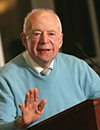
Richard S. Bower is a senior partner of Bower Rohr & Associates, an economic research and consulting firm. He is also the Leon E. Williams Professor of Finance and Managerial Economics, Emeritus, at the Amos Tuck School of Business Administration at Dartmouth College. As a partner of Bower Rohr & Associates, he consults and offers expert testimony on economic and financial matters, primarily matters involving regulation. Among his recent clients are the New York Public Service Commission, the Attorney General of the State of Vermont, Duquesne Power Company, the Vermont Department of Public Service and the United Illuminating Company. Dr. Bower received a Bachelor's Degree in Economics from Kenyon College in 1949, an M.B.A. from Columbia University in 1955, and a Ph.D. in Managerial Economics from Cornell University in 1962. He taught at Vanderbilt University in the years 1959-1962. He is a former editor of the journal, Financial Management, and former President of the Financial Management Association. Dr. Bower has published numerous articles on finance and regulation. From January 1979 to February 1981 Dr. Bower served as a Commissioner on the New York Public Service Commission.
Michael Brennan 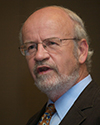
Michael Brennan is Professor Emeritus at the University of California, Los Angeles, and Professor of Finance at the London Business School. His research interests include asset pricing, corporate finance, the pricing and role of derivative securities, market microstructure, and the role of information in capital markets, and he has published extensively in all of these areas. He is currently working on several issues, including: the problem of asset allocation when investors face time varying opportunity sets, initial public offerings and the allocation of control rights in the corporation, the determinants of international flows of portfolio investment, the role of convertible securities in corporate finance, and corporate hedging strategies. A former President of the American Finance Association, he is currently President of the Society for Financial Studies and the Western Finance Association. He has served as Editor of the Journal of Finance and was the Founding Editor of the Review of Financial Studies. He has consulted extensively for corporations in Canada and the US, and in 1995 he was awarded the INQUIRE Europe prize for his work on corporate hedging strategies.
Eugene Brigham (1930 - 2024) 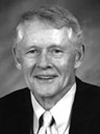
Professor Brigham received his BS from the University of North Carolina, and both his MBA and Ph.D. degrees from the University of California at Berkeley. His academic background includes appointments at UCLA, the University of Wisconsin, and the University of Florida. He served as Department Chairman at both UCLA and Florida, and he founded and then served for 25 years as Director of Florida's Public Utility Research Center. He has also consulted extensively with utilities, financial institutions, industrial companies, and government agencies. His textbooks on financial management are used in over 1,000 colleges and universities, and they have been translated into 15 languages. He retired from Florida in 1995, but he still teaches there, revises his textbooks, does consulting, and is engaged in venture capital financing. When not working, he hikes and climbs mountains during the year 2000, he hiked in Norway, California, and New Zealand. He also plays golf (badly) (Editor's Note: His words, not ours!). Dr. Brigham's greatest accomplishment was going from new assistant professor to full professor at UCLA in five years. (Admittedly, though, it was a lot easier back in the old days!) His greatest future challenge is to work with a terrific set of co-authors to continue improving his textbooks.
John Campbell 
John Y. Campbell is the Morton L. and Carole S. Olshan Professor of Economics at Harvard University, where he has taught since 1994.
Campbell has published over 100 articles on various aspects of finance and macroeconomics, including fixed-income securities, equity valuation, portfolio choice, and household finance. His books include Financial Decisions and Markets: A Course in Asset Pricing (Princeton University Press 2018), The Squam Lake Report: Fixing the Financial System (with the Squam Lake Group of financial economists, PUP 2010), Strategic Asset Allocation: Portfolio Choice for Long-Term Investors (with Luis Viceira, Oxford University Press 2002), and The Econometrics of Financial Markets (with Andrew Lo and Craig MacKinlay, PUP 1997).
Willard T. Carleton (1934 - 2024)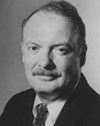
Willard T. Carleton is the Donald R. Diamond Professor at the University of Arizona. He received his AB from Dartmouth, MBA from the Amos Tuck School (Dartmouth), and MA and Ph.D. degrees in economics from the University of Wisconsin. Prior to joining the Arizona faculty in 1984, Dr. Carleton held chairs at the University of North Carolina and at the Tuck School. In 1977-78 he served as President of the Financial Management Association and from 1981 to 1984 was Editor of Financial Management. From 1980 to 1984, Dr. Carleton served on the board of College Retirement Equities Fund; since 1984, he has been on the board of the Teachers Insurance and Annuity Association. Dr. Carleton has published articles on a wide range of economics and finance topics over the past 38 years. His current research interests include private placements and corporate governance.
William Christie 
William Christie is the Frances Hampton Currey Professor of Management and Professor of Law in the Owen Graduate School of Management, Vanderbilt University. By studying the operations of the major financial markets in the mid-1990s,he and Professor Paul Schultz of Notre Dame University, concluded that Nasdaq market makers were implicitly colluding to maintain artificially high trading profits at the expense of investors. His research subsequently resulted in a sweeping reform of the NASDAQ market, the introduction of the SEC Order Handling Rules, and a $1.027 billion settlement against the defendants.
He served as Dean of the Owen Graduate School of Management from 2000 to 2004, and served as associate dean for faculty development at Owen from September 1999 to July 2000, and from August 2007 to October 2008. He received a Vanderbilt Chair of Teaching Excellence in 1996 and Owen’s James A. Webb Jr. Award for Excellence in Teaching on five occasions between 1994 and 2014. He is also a five-time recipient of the EMBA Teaching award.
He is a member of the Board of Trustees of the Financial Management Association, having served as chair between October 2018-2020 and served as President of the FMA from October 2016-2017.
Jeffrey Coles 
Jeffrey L. Coles is Professor and David Eccles Chair of Finance at the University of Utah's David Eccles School of Business.
Jeff has teaching and research interests in compensation, corporate control and governance, law and economics, asset pricing, organization structure, and the utility industry. He has published numerous academic papers in premier journals and has received awards for teaching and research as a faculty member and from various other universities, as well as from the BSI Gamma Foundation, FMA Honor Society, and the Journal of Financial Economics. Jeff was awarded the Henry J. Newell Honors Fellowship from Stanford University and the Leland M. Backstrand Memorial Prize in Economics from Pomona College. He is a past president of the Financial Management Association.
Jennifer Conrad 
Jennifer Conrad is the Dalton L. McMichael Sr. Distinguished Professor of finance and the Senior Associate Dean for Academic Affairs. She currently conducts research in the investments area, while some of her earlier work concentrated on the causes of predictable patterns in returns and trading strategies related to these patterns, such as contrarian investing. More recently, she is working on the relation between credit default swaps and the equity market, and the determinants and effects of high-frequency trading. Dr. Conrad teaches financial management and investments. She has won three teaching awards and the research award at UNC Kenan-Flagler. She has served on the board of directors of the Financial Management Association, the Western Finance Association, and the American Finance Association. She is a past president of the Financial Management Association and the current chair of its board of trustees.
David J. Denis
Dave joined the Katz faculty in 2011 after previously serving on the faculty at Virginia Tech (1989-1995) and Purdue University's Krannert School of Management (1995-2011). His primary teaching and research interests are in the area of corporate finance. He is the author of over 50 published articles in leading peer-reviewed journals on topics related to corporate governance, corporate financial policies, corporate organizational structure, corporate valuation, and entrepreneurial finance. Dave’s teaching and research have garnered him multiple awards throughout his career. He is currently an Editor of the
Review of Financial Studies and has served as Editor, Co-Editor, and Associate Editor of the
Journal of Corporate Finance, Journal of Finance, and
Journal of Financial Research. Dave has been actively involved in FMA as European Conference Program Co-Chair, 2010, Vice President – 2013, and President, 2015 – 2016. He currently serves on the Board of Trustees. Dave received his BS in finance and managerial statistics from Syracuse University and his MBA in finance and PhD in finance from the University of Michigan.
Douglas Diamond
Douglas W. Diamond specializes in the study of financial intermediaries, financial crises, and liquidity. His work has appeared in such notable journals as the Journal of Financial Economics, the Journal of Finance, the Review of Economic Studies, the American Economic Review, and the Journal of Political Economy. His research has been funded with grants from the National Science Foundation and the Garn Institute of Finance. He has taught at Yale and was a visiting professor at the Hong Kong University of Science and Technology as well as the University of Bonn. He is a research associate of the National Bureau of Economic Research and worked for the Board of Governors of the Federal Reserve System while a graduate student. In addition to his roles as a researcher and professor, Diamond is a visiting scholar at the Federal Reserve Bank of Richmond, a position he has held since 1990, and is on the Board of Directors of the Center for Research in Security Prices. Diamond is a former president of the American Finance Association and the Western Finance Association. He is also a fellow of the Econometric Society, the American Academy of Arts and Sciences, and the American Finance Association. He joined Chicago Booth in 1979. Diamond earned a bachelor's degree in economics from Brown University in 1975. He earned master's degrees in 1976 and 1977 and a PhD in 1980 in economics from Yale University.
Gordon Donaldson (1922 - 2010)
Gordon Donaldson is the Willard Prescot Smith Professor of Corporate Finance, Emeritus, at the Harvard Business School. He holds a B.Com from the University of Manitoba, an MA from the University of Toronto, an MBA from the University of Chicago, and a DCS from Harvard University. Dr. Donaldson began his academic career at the University of Manitoba (Canada), where he taught for 10 years before joining the faculty of the Harvard Business School in 1955, from which he retired in 1993. While at Harvard, he served for a time as Area Chairman for Finance, and taught in the MBA program, the doctoral program and various executive programs. For two years, he taught in Europe, first at IMEDE in Lausanne, Switzerland and later as chairman of Harvard's Senior Management Program abroad. He has served as consultant to a number of U.S., Canadian, and European corporations.
He was a co-author with Hunt and Williams of a popular text and casebook: Basic Business Finance (Fourth Edition, 1977). He has published a number of research monographs, including Corporate Debt Capacity (1961), Strategy for Financial Mobility (1969), Decision Making at the Top (with Lorsch, 1983), Managing Corporate Wealth (1984), and Corporate Restructurings: Managing the Change from Within (1994). Dr. Donaldson served as President of FMA in 1976-1977. Over his career, he has written for a number of journals, including the Harvard Business Review, the Journal of Financial Economics, and the Journal of Applied Corporate Finance. His articles have appeared in a number of collections of academic writings in finance. He and his wife now reside in Cape Elizabeth, Maine, and Parkland, Florida.
Alex Edmans 
Alex Edmans is Professor of Finance at London Business School and Managing Editor of the Review of Finance. Alex graduated from Oxford University and then worked for Morgan Stanley in investment banking (London) and fixed income sales and trading (New York). After a PhD in Finance from MIT Sloan as a Fulbright Scholar, he joined Wharton in 2007 and was tenured in 2013 shortly before moving to LBS.
Alex’s research interests are in corporate finance, responsible business and behavioural finance. He has published in the American Economic Review, Journal of Finance, Journal of Financial Economics, Review of Financial Studies, and Journal of Economic Literature. Alex was the FMA Keynote Speaker in 2021, giving the talk The Purpose of a Finance Professor. He has also spoken at the World Economic Forum in Davos, testified in the UK Parliament, and given the TED talk What to Trust in a Post-Truth World and the TEDx talk The Social Responsibility of Business with a combined 2.4 million views. Alex also serves as Mercers’ School Memorial Professor of Business at Gresham College, giving a four-year programme of lectures to the public. His series are on The Principles of Finance (2021/2), The Psychology of Finance (2020/1), Business Skills for the 21st Century (2019/20) and How Business Can Better Serve Society (2018/9).
Alex’s book, Grow the Pie: How Great Companies Deliver Both Purpose and Profit, was named to the Financial Times Best Business Books of 2020 and won the Financial Times award for Excellence in Sustainable Finance Education. He is a coauthor of the 14th edition of Principles of Corporate Finance (with Brealey, Myers, and Allen) to be published in Spring 2022. At Wharton, Alex won 14 teaching awards in six years. At LBS, he won Best Teacher awards for both the MBA and Masters in Financial Analysis programmes and the Excellence in Teaching award for best professor across all programmes.
Robert Engle
Robert Engle, the Michael Armellino Professor of Finance at New York University's Stern School of Business, was awarded the 2003 Nobel Prize in Economics for his research on the concept of autoregressive conditional heteroskedasticity (ARCH). He developed this method for statistical modeling of time-varying volatility and demonstrated that these techniques accurately capture the properties of many time series. Professor Engle shared the prize with Clive W J Granger of the University of California at San Diego.
Professor Engle s interest in financial econometrics covers equities, interest rates, exchange rates and option pricing. He is currently developing methods to analyze large systems of assets, real-time volatility, market microstructure and extreme market movements. He has published more than 100 academic papers and authored four books. His articles have appeared in such publications as Econometrica, Journal of Business and Economic Statistics, Journal of Econometrics, Journal of the American Statistical Association, American Economic Review, Journal of Political Economy, Journal of Finance, Review of Financial Studies, and Journal of Financial Economics.
Eugene Fama
Eugene F. Fama is widely recognized as the "father of modern finance." Fama's financial research is well known in both the economics and investment community. He is strongly identified with research on markets, particularly with regard to the efficient market hypothesis. Through his research he has brought an empirical and scientific rigor to the field of investment management, transforming the way finance is viewed and conducted. He is a prolific author and researcher, having written two books and published more than 100 articles in academic journals. Fama is among the most cited of America's researchers. He focuses much of his study on the relation between risk and return and implications for portfolio management.
Mark J. Flannery
Mark's interests include government regulation of the financial sector, information content of security prices, financial management of financial institutions, and asset pricing. Mark teaches corporate finance and financial management of financial institutions in the graduate program at the University of Florida. His current research focuses on the information content of security prices. Mark has served on the faculty of the University of Pennsylvania and the University of North Carolina, and as a visiting professor at the London Business School and the University of New South Wales. Mark received his PhD, M Phil, and MA from Yale University and his AB from Princeton University.
Ken French
Ken French is currently the Roth Family Distinguished Professor of Finance at Amos Tuck School of Business, Dartmouth College. French is an expert on the behavior of security prices, investment strategies, and valuation. His recent research focuses on tests of asset pricing models, the trade-off between risk and return in domestic and international financial markets, dividend policy, the cost of capital, and the relation between capital structure and firm value. French is a Research Associate at the National Bureau of Economic Research, an Advisory Editor of the Journal of Financial Economics, and a past director of the American Finance Association. He received his BS from Lehigh University (1975); his MBA from University of Rochester (1978); his MS from the University of Rochester (1981) and his PhD from the University of Rochester (1983).
John Graham
John Graham is currently the D Richard Mead Jr. Family Professor of Finance at Duke University. John Graham is a professor at the Duke University’s Fuqua School of Business, a research associate for the NBER, and a regular guest commentator on CNBC. A Phi Beta Kappa winner, Graham has accumulated a lengthy list of award winning research papers. Graham serves as director of the "Duke/CFO Business Outlook Survey”. As the director of the survey, he is quoted in a variety of mass media, such as The Wall Street Journal.
Richard Green (1953 - 2015)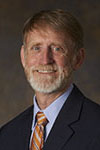
Richard C. Green's intellect and affability earned him respect as a teacher, researcher and leader at the Tepper School of Business and one of the presiding financial economists of his generation. His research created an enduring impact on the field, from corporate finance to personal finance to asset pricing. Widely published and steeped in a wide range of financial topics, Green served as an associate editor, co-editor or editor at five different journals, including the editorship of the Journal of Finance.
Born in Arizona, Green made his way east all because of academia, from a bachelor’s in English at Pomona (Calif.) College to a master’s in business and Ph.D. in finance from the University of Wisconsin-Madison. Green started at Carnegie Mellon as an assistant professor in what was then the Graduate School of Industrial Administration. He became associate professor in 1987 and professor in 1990, the head of the Tepper School Ph.D. program (2003-08), Associate Dean for Research (2008-09), and Senior Associate Dean of Faculty and Research (2009-14). His work took him around the globe: to the University of British Columbia, Union Bank of Finland, Stockholm School of Economics and Norwegian Finance Institute. He also served in visiting professor roles at universities of Utah, Texas and Virginia.
He was heralded as the only financial economist to serve as president of all three of the leading scholarly societies in the field: the Western Finance Association, American Finance Association and Society for Financial Studies. His two-year term as president of the Society for Financial Studies was the most recent such position, ending in July 2014. Green also served on the board of directors and as a research associate in asset pricing for the National Bureau of Economic Research (NBER), the nation’s leading nonprofit economic research organization, founded in 1920.
Green won numerous honors throughout his career. His research awards included two Smith Breeden Prizes for Distinguished Paper in the Journal of Finance, three awards from the Institute for Quantitative Research in Finance Q-Group for research advancing the practice of global investment management and the TIAA-CREF Paul Samuelson Award for Outstanding Writing on Lifelong Financial Security.
Martin Gruber
Martin J. Gruber is Professor Emeritus at New York University's Stern School of Business. In his current position, Professor Gruber teaches courses in advanced portfolio theory, investment philosophies, and a Ph.D. seminar in investments. Professor Gruber has been with NYU Stern for more than 35 years. He is coauthor of the best-selling text in Finance entitled Modern Portfolio Theory and Investment Analysis. His primary research areas of interest include mutual funds; performance management; portfolio construction and analysis; portfolio management; and portfolio theory, and he has published numerous articles in publications including Journal of Finance; Journal of Business; Management Science; Studies in Banking and Finance; and Japan and the World Economy.
Professor Gruber is past president of the American Finance Association and is a fellow of the American Finance Association. Professor Gruber received his Bachelor of Science in chemical engineering from Massachusetts Institute of Technology and his Master of Business Administration in production management and his Doctor of Philosophy in finance and economics from Columbia University.
Oliver Hart
Oliver Hart is currently the Andrew E. Furer Professor of Economics at Harvard University, where he has taught since 1993. He works mainly on contract theory, the theory of the firm, corporate finance, and law and economics. His research centers on the roles that ownership structure and contractual arrangements play in the governance and boundaries of corporations. He has published a book (Firms, Contracts, and Financial Structure, Oxford University Press, 1995) and numerous journal articles. He has used his theoretical work on firms in two legal cases as a government expert (Black and Decker v. U.S.A. and WFC Holdings Corp. (Wells Fargo) v. U.S.A.).
He is the 2016 co-recipient of the Sveriges Riksbank Prize in Economic Sciences in Memory of Alfred Nobel, a Fellow of the Econometric Society, the American Academy of Arts and Sciences, the British Academy, and the American Finance Association, a member of the National Academy of Sciences, and has several honorary degrees. He has been president of the American Law and Economics Association and a vice president of the American Economic Association.
Campbell R. "Cam" Harvey 

Campbell (Cam) R. Harvey is Professor of Finance at the Fuqua School of Business, Duke University and a Research Associate of the National Bureau of Economic Research in Cambridge, Massachusetts. He served as President of the American Finance Association in 2016. He obtained his doctorate at the University of Chicago in business finance. He has served on the faculties of the Stockholm School of Economics, the Helsinki School of Economics, and the Booth School of Business at the University of Chicago. He has also been a visiting scholar at the Board of Governors of the Federal Reserve System. He is a Fellow of the American Finance Association.
He received the 2016 and 2015 Best Paper Awards from the Journal of Portfolio Management for his research on distinguishing luck from skill. He has also received eight Graham and Dodd Awards/Scrolls for excellence in financial writing from the CFA Institute. He has published over 125 scholarly articles on topics spanning investment finance, emerging markets, corporate finance, behavioral finance, financial econometrics and computer science.
He is a Founding Director of the Duke-CFO Survey. This widely watched quarterly survey polls over 1,500 CFOs worldwide. He served as the Editor of The Journal of Finance from 2006-2012.
Over the past five years, he has taught “Innovation and Cryptoventures” at Duke University. The course focuses on blockchain technology covering both the mechanics of blockchains as well as practical applications.
Joe Henrich 
Dr. Henrich is currently the Ruth Moore Professor of Biological Anthropology in the Department of Human Evolutionary Biology at Harvard University. Before moving to Harvard, he was a professor of both Economics and Psychology at the University of British Columbia for nearly a decade, where he held the Canada Research Chair in Culture, Cognition and Coevolution. His research deploys evolutionary theory to understand how human psychology gives rise to cultural evolution and how this has shaped our species’ genetic evolution. Using insights generated from this approach, Professor Henrich has explored a variety of topics, including economic decision-making, social norms, fairness, religion, marriage, prestige, cooperation and innovation. He’s conducted long-term anthropological fieldwork in Peru, Chile and in the South Pacific, as well as having spearheaded several large comparative projects. In 2004 he won the Presidential Early Career Award for young scientists, and, in 2009, the Early Career Award for Distinguished Contributions bestowed by the Human Behavior and Evolution Society. In 2013-14, Dr. Henrich held the Peter and Charlotte Schoenenfeld Faculty Fellowship at NYU’s Stern School of Business. In 2018, the Society for Personality and Social Psychology awarded him the Wegner Prize for Theoretical Innovation. From 2010 to 2019, Dr. Henrich was a senior fellow in the Canadian Institute for Advanced Research in the Institutions, Organizations and Growth group and he became a fellow of the Cognitive Science Society in 2021. In 2016, he published The Secret of Our Success (Princeton) and in 2020, The WEIRDest People in the World: How the West became psychologically peculiar and particularly prosperous (FSG).
David Hirshleifer 
David Hirshleifer is Merage Chair and Distinguished Professor of Finance at the Merage School of Business, University of California-Irvine. He is a Fellow and former-President of the American Finance Association. He currently serves as Coeditor of the Journal of Financial Economics, and has served as Executive Editor of the Review of Financial Studies, director of the American and Western Finance Associations, and co-editor and associate editor at leading finance, economics, and business journals. In his Presidential Address to the American Finance Association, he argues for an emerging paradigm, social economics and finance, which studies how biases in the social transmission of ideas, information and behavior affects markets and asset prices. His research interests include behavioral economics and finance, and other topics in the investments and corporate finance fields. His papers have won various research awards, including the Smith Breeden Award for outstanding paper in the Journal of Finance. He has been keynote or plenary speaker at many conferences internationally. He was previously on the faculties of UCLA, University of Michigan, and Ohio State University, and he received his PhD from the University of Chicago. In his ample spare time, he composes classical music and sight-reads on the piano.
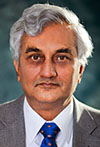 Ravi Jagannathan
Ravi Jagannathan
Dr. Ravi Jagannathan is the Chicago Mercantile Exchange/John F. Sandner Professor of Finance at Northwestern University's Kellogg School of Management and Co-Director of the Financial Institutions and Markets Research Center at the Kellogg School (1997 - present). He has previously held positions as Piper Jaffray Professor of Finance (1993 - 1997) and Associate Professor of Finance (1989 - 1993) at the University of Minnesota's Carlson School of Management, Assistant Professor of finance at Northwestern University's Kellogg School (1983 - 1989), and as a Distinguished Visiting Professor at the Hong Kong University of Science and Technology (1994 - 1995), and has appointments as Special Terms professor at Shanghai Advanced Institute of Finance, Shanghai Jiao Tong University (2012+) and the Indian School of Business (2012-2014) and the Area Leader for Finance, Economics, and Public Policy at the Indian School of Business (2014 - 2018).
Ravi received a Ph.D. in Financial Economics (1983) and an M.S. in Financial Economics (1981) from Carnegie Mellon University, an M.B.A. from the Indian Institute of Management at Ahmedabad (1972), and a B.E. in Mechanical Engineering from the University of Madras (1970). His Ph.D dissertation received the Alexander Henderson award for excellence in economics.
Ravi has served on the editorial boards of leading academic journals, and is a former executive editor of the Review of Financial Studies. He has served as a member of the Board of Directors of the American Finance Association and the Western Finance Association and is a past President of the Western Finance Association, the Society of Financial Studies, the Financial Intermediation Research Society, and the Society for Financial Econometrics. He is a research associate of the National Bureau of Economic Research, a fellow of the Society for Financial Econometrics, and a member of the Board of Directors of the Financial Management Association.
Michael Jensen (1939-2024)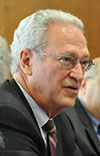
Michael C. Jensen, Jesse Isidor Straus Professor of Business Administration, Emeritus, joined the faculty of the Harvard Business School in 1985. He joined the Monitor Company in 2000 as Managing Director of the Organizational Strategy Practice. He was LaClare Professor of Finance and Business Administration at the William E. Simon Graduate School of Business Administration, University of Rochester, from 1984-1988, Professor from 1979-1984, Associate Professor from 1971-1979, and Assistant Professor from 1967-1971. He founded the Managerial Economics Research Center at the University of Rochester in 1977 and served as its Director until 1988.
Professor Jensen earned his Ph.D. in Economics, Finance, and Accounting and his M.B.A. in Finance from the University of Chicago and an A.B. degree from Macalester College. He was awarded the honorary degree, Docteur Honoris Causa, by Universite Catholique de Louvain, Louvain-la-Neuve, Belgium, July, 1991 as well as by the University of Bern, Bern, Switzerland, December 2000. In June of 2001, he was awarded an honorary Doctor of Laws degree by the William E. Simon Graduate School of Business Administration, University of Rochester, Rochester, NY. He served as a Visiting Scholar at the Tuck School of Business at Dartmouth College from July 2001 to June 2002. In 2002 he was named a Fellow of the European Corporate Governance Institute (ECGI). Professor Jensen is the author of more than 60 scientific papers, in addition to numerous articles, comments, and editorials published in the popular media on a wide range of economic, finance and business-related topics.
 Wei Jiang
Wei Jiang
Wei Jiang is Arthur F. Burns Professor of Free and Competitive Enterprise in the Finance and Economics Division, and the Vice Dean (for Curriculum and Instruction) at Columbia Business School. She is also a Scholar-in-Residence at Columbia Law School, a Senior Fellow at the Program on Corporate Governance at Harvard Law School, and a Research Associate of the NBER—Law and Economics. Professor Jiang received her B.A. and M.A. in international economics from Fudan University (China), and Ph.D. in economics from the University of Chicago in 2001 after which she joined Columbia Business School. She was an investment banking associate at Prudential Securities (Shanghai) before pursuing her Ph.D. degree.
Professor Jiang is a leading scholar in corporate governance; in particular, she pioneered research in hedge fund activism. She has published extensively in top economics, finance, and law journals, and her research has been frequently featured in major media, including the Wall Street Journal, Economist, Institutional Investors, Money, Fortune, Business Week, New York Times and Financial Times. She received numerous awards for research excellence, including the Smith-Breeden Distinguished Paper Prize from the Journal of Finance and the Michael J. Brennan Best Paper Award from the Review of Financial Studies, as well as the best paper prizes from the Western Finance Association, Chicago Quantitative Alliance, UK Inquire, the Q-Group, and the IRRC Institute. She is currently an associate editor at the Journal of Finance and served on the editorial boards of Review of Financial Studies. Previously she was a Finance Department Editor at Management Science.
Kose John 
Kose John is the Charles William Gerstenberg Professor of Banking and Finance at the Stern School of Business, New York University. He holds a Ph.D. from University of Florida. He has also taught at the University of Chicago, Columbia University, and Institut D'Etudes Politiques de Paris (Sciences PO). He has won several awards including the Batterymarch Fellowship in 1983 and the Jensen Prize for the Best Paper published in 2000 in the Journal of Financial Economics. He is on the Nominating Committee for the Nobel Prize in Economics for 2017. He is the author of two books (on futures markets and dividend policy) and the editor of 23 books and special issues of finance journals, on topics such as financial stability, financial distress, and valuation of distressed securities, corporate governance, and investments innovations in finance. He has published over 103 research articles in the major finance and economics journals. His recent research focuses on banking, financial crisis, corporate governance, top-management compensation, and financial distress, valuation of distressed claims, and comparative bankruptcy and governance systems. He has completed 57 Working Papers in addition to his published work. He serves as the President of the Financial Management Association International. He also serves as the Program Chair of the Association of Financial Economists. He has been a mentor and advisor to a large number (90) of doctoral students who are finance professors and finance practitioners all over the world.
Andrew Karolyi
Professor Karolyi is an internationally-known scholar in the area of investment management, with a specialization in the study of international financial markets. He has published extensively in journals in finance and economics, including the Journal of Finance, Journal of Financial Economics and Review of Financial Studies, and has published several books and monographs. His research has been covered extensively in print and electronic media, including The Wall Street Journal, Financial Times, The Economist, Time, New York Times, Washington Post, Forbes, BusinessWeek, and CNBC.
Karolyi currently serves as executive editor of the Review of Financial Studies, one of the top-tier journals in finance. He is and has also served as an associate editor for a variety of journals, including the Journal of Finance, Journal of Financial Economics, Journal of Empirical Finance, Journal of Banking and Finance, Review of Finance and the Pacific Basin Finance Journal. He is a recipient of the Fama/DFA Prize for Capital Markets and Asset Pricing (2005), the William F. Sharpe Award for Scholarship in Finance (2001), the Journal of Empirical Finance's Biennial Best Paper Prize (2006), the Fisher College of Business' Pace Setter Awards for Excellence in Research and Graduate Teaching and Johnson's Prize for Excellence in Research in 2010.
He joined Johnson in 2009, after teaching for 19 years at the Fisher College of Business of The Ohio State University. He leads various executive education programs in the U.S., Canada, Europe, and Asia, and is actively involved in consulting with corporations, banks, investment firms, stock exchanges, and law firms. He currently chairs the board of trustees and is past president of the Financial Management Association International and has served as a director of the American Finance Association. Karolyi received his BA (Honors) in economics from McGill University in 1983 and worked at the Bank of Canada for several years in its research department. He subsequently earned his MBA and PhD degrees in finance at the Graduate School of Business of the University of Chicago.
Jonathan M. Karpoff
Jonathan M. Karpoff is the Washington Mutual Endowed Chair in Innovation and Professor of Finance at the University of Washington’s Michael G. Foster School of Business. Jon serves as an Associate Editor for the Journal of Finance, Journal of Financial Economics, Journal of Financial and Quantitative Analysis, and Managerial and Decision Economics. He is a member of the Board of Trustees for The Financial Management Association International, an International Research Fellow at Oxford’s Centre for Corporate Reputation, an External Fellow for the Center for Corporate Governance at Drexel University, and a member of the Financial Economists Roundtable. Jon received his BA (1978) from the University of Alaska - Anchorage, and his MA (1980) and Ph.D (1982) degrees from UCLA. He has held appointments as the John M. Olin Visiting Professor at the University of Chicago’s Graduate School of Business (1998) and as the Visiting Alumni Professor of Finance and Alumni Research Scholar at the Emory University’s Goizueta Business School (2000-02). Previously, Jon served as President of The Financial Management Association International from 2007-08, Director of the UW’s CFO Forum from 2004-2007, and Managing Editor of the Journal of Financial and Quantitative Analysis from 1989-2003. He was the founding Director of the University of Washington’s Environmental Management Program, an Associate Editor of Management Science from 2010-2016, and a member of the Searle Civil Justice Institute Task Force on Foreign Bribery from 2012-2015.
Jon’s research seeks to understand how and when Adam Smith’s Invisible Hand works, or does not work, to coordinate economic activities and promote social well-being. This research addresses a wide range of topics, from fisheries management to corporate governance and business misconduct. In 2003, Jon was awarded the Griliches Prize in Empirical Economics for his research on leadership in arctic exploration. His research on corporate financial scandals was recognized with the Best Paper Award at the University of Chicago’s CRSP Forum in 2006 and the William F. Sharpe (JFQA) Best Paper Award in 2009. Different papers won the CRSP Forum Best Paper Award again in 2008, the Best Paper Award at the George Mason University Conference on Corporate Governance and Fraud Prevention in 2009, the Best Paper Award at the Financial Research Association Conference in 2011, and the Best Corporate Finance Paper Award at the 2012 FMA meetings. In 2015, Jon received the award for outstanding contribution to research in corporate governance by the Drexel Center for Corporate Governance, and in 2016 he was selected for induction as a Financial Management Association Fellow. Jon’s work also is frequently cited in media outlets – including The New York Times, The Economist, The Wall Street Journal, and National Public Radio.
Ronald C. Lease (1940- 2022) 
Ronald C. Lease received his Metallurgical Engineering degree from the Colorado School of Mines, and his M.S. and Ph.D. degrees in finance from Purdue University. Before pursuing his Ph.D. studies, Professor Lease worked in process engineering and computerized control systems for the Aluminum Company of America. Until July 2000, Professor Lease was Kendall D. Garff Professor of Finance in the David Eccles School of Business at the University of Utah. Prior to this position, he held faculty appointments at Tulane University, where he was the A.B. Freeman Professor of Finance, and visiting faculty appointments at the University of Michigan, Purdue University, and the University of Chicago. He currently is Professor Emeritus at the University of Utah and Visiting Professor of Finance at the University of Arizona.
Professor Lease has published extensively in the major journals such as the Journal of Finance, Journal of Financial Economics, Journal of Business, Financial Management, Journal of Applied Corporate Finance, and Journal of Financial and Quantitative Analysis. His co- authored book, Dividend Policy: Its Impact on Firm Value was published by the Harvard Business School Press/FMA. He has served as associate editor of the Journal of Corporate Finance, the Journal of Financial Research, and Financial Management. Professor Lease has been active in professional associations, particularly the Financial Management Association. In FMA he has served as Secretary/Treasurer, editor of the Survey and Synthesis in Finance book series, Program Vice-President, President, and Chair of the Board of Trustees. Professor Lease's teaching specialty is corporate finance. He has won outstanding teaching awards at Purdue University, the University of Chicago, Tulane University, and the University of Utah.
Hayne Leland
Hayne E. Leland’s research on option pricing, capital structure and risk management has influenced the fields of banking, asset pricing, bond valuation, portfolio management, and portfolio insurance. Professor Leland is a past President of the American Finance Association. At the University of California-Berkeley since 1974, he is the Arno Rayner Professor Emeritus of Finance and Management Berkeley’s Haas School of Business. Professor Leland holds a Ph.D. and A.B from Harvard, and an M.Sc degree from the London School of Economics.
Based on his research on portfolio insurance, Professor Leland founded Leland O’Brien Rubinstein (LOR), for which he was named one of Fortune Magazine’s “Businessmen of the Year” in 1987. LOR, the subject of Harvard case studies, was a pioneer in the field of portfolio insurance and developed SuperTrust, the nation’s first exchange-traded fund (ETF). LOR’s contributions, which have since been adopted by numerous financial institutions worldwide, have directly resulted in the tremendous growth of ETFs, which now account for several billion dollars in daily trading volume.
Professor Leland has received numerous accolades for his seminal research, including the Stephen A. Ross Award for Research in Financial Engineering and an honorary Doctorate degree from the University of Paris (Dauphine). He was the inaugural Pembroke Visiting Professor in International Finance at the University of Cambridge (UK) and has served on the scientific advisory boards of several institutions including Goldman Sachs and the Paris Stock Exchange. Professor Leland was an independent Trustee of Barclays Global Investors Funds, one of the world’s largest mutual fund complexes (now part of BlackRock).
Professor Leland has been invited to address numerous distinguished panels of finance academics and policymakers at the Federal Reserve, the Bank of International Settlements, the European Central Bank, and the Deutsche Bundesbank. His current research interest include developing innovative financial structures that allow energy market participants to capitalize or hedge future resource production, and the design of home equity-sharing contracts as a solution to the present housing market crisis.
Dennis Logue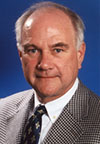
Dennis Logue is Professor Emeritus at the Amos Tuck School of Business Administration at Dartmouth College, and the Chairman of the Board of Directors of Ledyard National Bank. From 2001 to September 2005, he served as the Dean and Fred E. Brown Chair of the Michael F. Price College of Business at the University of Oklahoma. Prior to 2001 he was the Steven Roth Professor of Management at the Amos Tuck School of Business Administration at Dartmouth College, serving on the faculty there since 1974. Dr. Logue has taught numerous courses at the graduate level, including Corporate Finance, Corporate Governance, Corporate Valuation, Financial Markets and Mergers and Acquisitions. He is a Fellow and former President of the Financial Management Association, and a member of the Financial Economists Roundtable. Dr. Logue has written or edited 11 books and numerous articles on topics ranging from pension plans and initial public offerings to market micro-structure. His current research focuses on corporate governance and corporate valuation.
In addition to his academic work, Dr. Logue has extensive business and consulting experience. From September 1986 through 1999, he was a member of the ARCO Pension Advisory Board. He was a founding director of Ledyard National Bank and a former director of Sallie Mae (GSE). Dr. Logue is currently a member of the Board of Directors of Waddell & Reed Financial, Abraxas Petroleum, Duckwall-ALCO Stores, and Hypertherm, Inc. He has been engaged as an expert witness and offered testimony on a variety of topics, including financial principles, valuation, business administration, credit analysis, pensions, and corporate governance. Dr. Logue’s clients have included the law firms Munger, Tolles & Olson and Robbins Geller Rudman & Dowd, as well the Pension Benefit Guaranty Corporation (PBGC), AT&T, the Paris Bourse, and the Toronto Stock Exchange.
Michelle Lowry 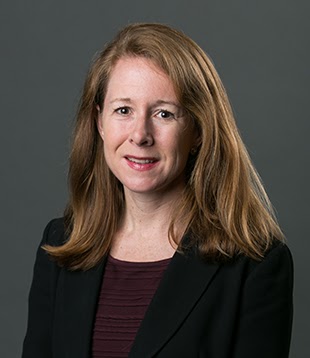
Michelle is the TD Bank Professor of Finance at the LeBow School of Business, Drexel University. She received her PhD from the University of Rochester, and was previously a professor at Penn State University. In addition, she is a past visiting professor at INSEAD and at the Wharton School.
She is an editor of the Review of Corporate Finance Studies, and past associate editor of both the Journal of Financial Economics and the Review of Financial Studies. She is a founding member of AFFECT (Academic Female Finance Committee), which strives for gender equality among the field of finance academics. Currently, she serves as a member of the AFFECT advisory board. She is President of the Financial Management Association (FMA), and she is a director of the American Finance Association (AFA) and a past director of the European Finance Association (EFA).
Her research focuses on a variety of issues in empirical corporate finance, including initial public offerings, corporate governance, shareholder voting, environmental and social issues, and mergers. She is particularly interested in the ways that companies’ corporate governance affects their performance around these corporate events. Her research has been published in top finance journals, including the Journal of Financial Economics, the Review of Financial Studies, and the Journal of Finance. She is also winner of the 2021 Jensen Prize, for Best Paper published in The Journal of Financial Economics in the areas of Corporate Finance and Organization. Her research also relates to the effects of policy on firm outcomes, in particular regulation related to firm governance and shareholder voting. In this vein, she participated in an SEC panel on shareholder voting. Her research has also attracted attention in the popular press, with cites in the Wall Street Journal, USA Today, NPR's Morning Edition, Forbes, and the Economist.
Ronald Masulis 
Ron Masulis is the Scientia Professor of Finance at the UNSW Business School, University of New South Wales. Ron received his MBA and PhD from the University of Chicago. He is a recognised authority in the areas of empirical corporate finance and corporate governance. His published research spans investment banking, financial institutions, market microstructure, international finance, private equity, law and economics and corporate governance topics such as mergers and acquisitions, boards of directors, executive compensation, ownership structure and business groups.
Among financial economists worldwide, he has one of the highest sustained rates of top tier publications and frequency of citations across a range of top journals including the Journal of Financial Economics, Journal of Finance, Review of Financial Studies, Journal of Accounting and Economics and Journal of Law and Economics.
Ron has won a number of top research awards, including five Journal of Financial Economics All Star Paper Awards. He is a former President of the Financial Management Association (2020-2021) serves on its Board of Trustees. He has served on the Board of Directors/Executive Committee of the American Finance Association, the Western Finance Association and the Financial Management Association (FMA). He has served as the FMA’s Vice President of Global Services and FMA's Vice President of the 2018 Program.
John McConnell
John J. McConnellis the Burton D. Morgan Distinguished Chair of Private Enterprise (in Finance) at the Krannert Graduate School of Management at Purdue University where he has been a faculty member since 1976. In addition to being a Professor of Finance, at the Krannert School, he has served as Director of Doctoral Programs and Research (1990-1998), Area Coordinator of Finance (1994-1998; 2006-2007), and Academic Director of Professional Masters Programs (2001-2006).
He received a B.A. in Economics from Denison University (1968), an M.B.A. from the University of Pittsburgh (1969), and a Ph.D. in Finance from Purdue University (1974). He has also taught at Ohio State University (1975-1976), the University of Minnesota (1981-1982), and Stanford University (1986-1987). He has taught courses in corporate finance, investments, and capital markets in the graduate and undergraduate programs of these universities. He received special recognition for his teaching as the winner of the Salgo Noren Outstanding Teacher Award (1993, 1995, 2011, and 2012), as the winner of the Most Effective Teacher MSM Program Award (1992), and as a winner of the Dean’s MBA Core Course Outstanding Teacher Award (2005, 2007, 2009, and 2011).
He has served as a member of the Boards of Directors of the Federal Home Loan Bank of Indianapolis, Harrington Financial Group, Inc., Harrington Bank FSB, Harrington West Financial Group, Inc., Los Padres Bank FSB, the American Finance Association, and the Western Finance Association. He currently serves as a member of the Advisory Board of the Global Finance Academy of the University College Dublin. He has served on the Investment Committees (as Chairman), the Compensation Committees (as Chairman), and the Audit Committees of Harrington West Financial Group, Inc., Harrington Bank FSB, and Los Padres Bank FSB.
Robert Merton
Robert C. Merton is the School of Management Distinguished Professor of Finance at MIT Sloan, and University Professor Emeritus at Harvard University. He was the George Fisher Baker Professor of Business Administration (1988–98) and the John and Natty McArthur University Professor (1998–2010) at Harvard Business School. After receiving a PhD in economics from MIT in 1970, Merton served on the finance faculty of MIT’s Sloan School of Management until 1988, at which time he was J.C. Penney Professor of Management.
He is currently resident scientist at Dimensional Holdings, Inc., where he is the creator of Target Retirement Solution, a global integrated retirement-funding solution system that addresses the deficiencies associated with traditional defined-benefit and defined-contribution pension plans. Merton received the Alfred Nobel Memorial Prize in Economic Sciences in 1997 for a new method to determine the value of derivatives. He is past president of the American Finance Association, a member of the National Academy of Sciences, and a Fellow of the American Academy of Arts and Sciences.
He is the author of Continuous-Time Finance and a coauthor of Cases in Financial Engineering: Applied Studies of Financial Innovation; The Global Financial System: A Functional Perspective; Finance; and Financial Economics. He has also been recognized for translating finance science into practice. Merton received the inaugural Financial Engineer of the Year Award from the International Association for Quantitative Finance (formerly International Association of Financial Engineers), which also elected him a Senior Fellow. He received the 2011 CME Group Melamed-Arditti Innovation Award, and the 2013 WFE Award for Excellence from World Federation of Exchanges. A Distinguished Fellow of the Institute for Quantitative Research in Finance (‘Q Group’) and a Fellow of the Financial Management Association, Merton received the Nicholas Molodovsky Award from the CFA Institute. He is a member of the Halls of Fame of the Fixed Income Analysts Society, Risk, and Derivatives Strategy magazines. Merton received Risk’s Lifetime Achievement Award for contributions to the field of risk management.
His research focuses on finance theory, including lifecycle and retirement finance, optimal portfolio selection, capital asset pricing, pricing of derivative securities, credit risk, loan guarantees, financial innovation, the dynamics of institutional change, and improving the methods of measuring and managing macro-financial systemic risk.
Merton received a BS in engineering mathematics from Columbia University, an MS in applied mathematics from California Institute of Technology, and a PhD in economics from MIT. He has also received honorary degrees from 14 universities.
Merton Howard Miller (1923 – 2000)
Merton Miller was an American economist, and the co-author of the Modigliani–Miller theorem (1958), which proposed the irrelevance of debt-equity structure. He shared the Nobel Memorial Prize in Economic Sciences in 1990, along with Harry Markowitz and William F. Sharpe. Miller spent most of his academic career at the University of Chicago's Booth School of Business.
Stewart Myers
Stewart C. Myers is the Robert C. Merton (1970) Professor of Finance, Emeritus at the MIT Sloan School of Management. Myers is past President of the American Finance Association, a Research Associate at the National Bureau of Economic Research and a principal of the Brattle Group, Inc. His textbook Principles of Corporate Finance (12th ed., with Richard Brealey and Franklin Allen) is known as the “bible” of financial management. His research focuses on the valuation of real and financial assets, corporate finance and financial aspects of government regulation of business. He introduced both the tradeoff and pecking order theories of capital structure and was the first to recognize the importance of real options in corporate finance. Myers is the author of influential research papers on many topics, including adjusted present value (APV), rate of return regulation, capital allocation and risk management in banking and insurance, real options, payout policy, and moral hazard and information issues in financing decisions. He has served as a director of Entergy Corporation and CAT Ltd. and as a manager of the Cambridge Endowment for Research in Finance. He holds an AB from Williams College and an MBA and a PhD from Stanford University..
Maureen O'Hara
Maureen O’Hara is the Robert W. Purcell Professor of Finance at the Johnson Graduate School of Management, Cornell University. She holds degrees from the University of Illinois (B.S. Economics), and Northwestern University (M.S. Economics and Ph.D. Finance), and Honorary Doctorates from Facultés Universitaires Catholiques à Mons (FUCAM), Belgium, Universität Bern, Switzerland, and University College Dublin.
Professor O'Hara's research focuses on issues in market microstructure, and she is the author of numerous journal articles as well as the book Market Microstructure Theory (Blackwell: 1995). Her most recent research looks at the how ETFs affect market stability, high frequency market microstructure, and corporate governance problems in banks. Dr. O'Hara also publishes widely on a broad range of topics including banking and financial intermediaries, law and finance, and experimental economics. Professor O’Hara has served as President of the American Finance Association, the Western Finance Association, the Financial Management Association, the Society for Financial Studies and the International Atlantic Economic Society. She was the Executive Editor of the Review of Financial Studies.
Professor O’Hara serves on the Board of Directors of NewStar Financial, a commercial finance company, and on the Board of Trustees of Teachers Insurance and Annuity Association (TIAA-CREF). She spent more than a decade on the Board of Directors of Investment Technology Group, Inc. (ITG), a global agency brokerage firm, most recently serving as Chairman of the board. She was a member of the CFTC-SEC Emerging Regulatory Issues Task Force (the “flash crash” committee), the Global Advisory Board of the Securities Exchange Board of India (SEBI), and the Advisory Board of the Office of Financial Research, U.S. Treasury, and she is currently serving on the SEC Equity Market Structure Advisory Board.
She has consulted for a number of companies and organizations, including Facebook, Microsoft, Merrill Lynch, Credit Suisse, the New York Stock Exchange, Bristol-Meyers Squibb, and the World Federation of Exchanges.
Monika Piazessi 
Monika Piazzesi is the Joan Kenny Professor of Economics at Stanford University, and a Professor (by courtesy) at the Stanford Graduate School of Business. She is a research associate at the NBER, where she was the director of the NBER Asset Pricing Program. She is also a CEPR Research Fellow, a SIEPR Senior Fellow, and a Fellow of the Academy of Arts and Sciences and the Econometric Society. During the years 2006-2014 she was co-editor of the Journal of Political Economy, and in 2015-2016 was the recipient of a Guggenheim Fellowship. Prior to joining Stanford, she taught at the University of Chicago and UCLA. She has received the Elaine Bennett Research Prize and the Bernacer Prize for Research in Macroeconomics and Finance.
George Pinches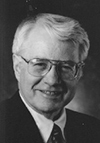
George Pinches is Professor Emeritus; his specialty is financial management, which he taught at the undergraduate, MBA, Executive MBA, and doctoral levels. He published 35 scholarly articles with appeared in journals such as Journal of Finance, Journal of Financial and Quantitative Analysis, Financial Management, and Journal of Applied Corporate Finance. His research was also published in top journals in other fields including Accounting Review, Journal of Risk and Insurance, Strategic Management Journal, and Journal of the Academy of Management. He wrote six books, one of which went through five editions and another is being revised for a fourth edition. He served as Vice President-Program and then as President of the Financial Management Association, as well as serving as president of three of the five regional academic finance organizations the Midwest Finance Association, the Southern Finance Association, and the Southwestern Finance Association.
After completing his B.S. and MBA degrees at Oklahoma State University, Dr. Pinches received his Ph.D. from Michigan State University. He was a faculty member at Oklahoma State University, University of Missouri-Columbia, University of Kansas (Wagnon Professor of Finance), and University of Missouri-Kansas City (Arvin Gottleib/Missouri Chair in Business Economics and Finance). He recently retired and now makes his home in Ardmore, Oklahoma.
Manju Puri 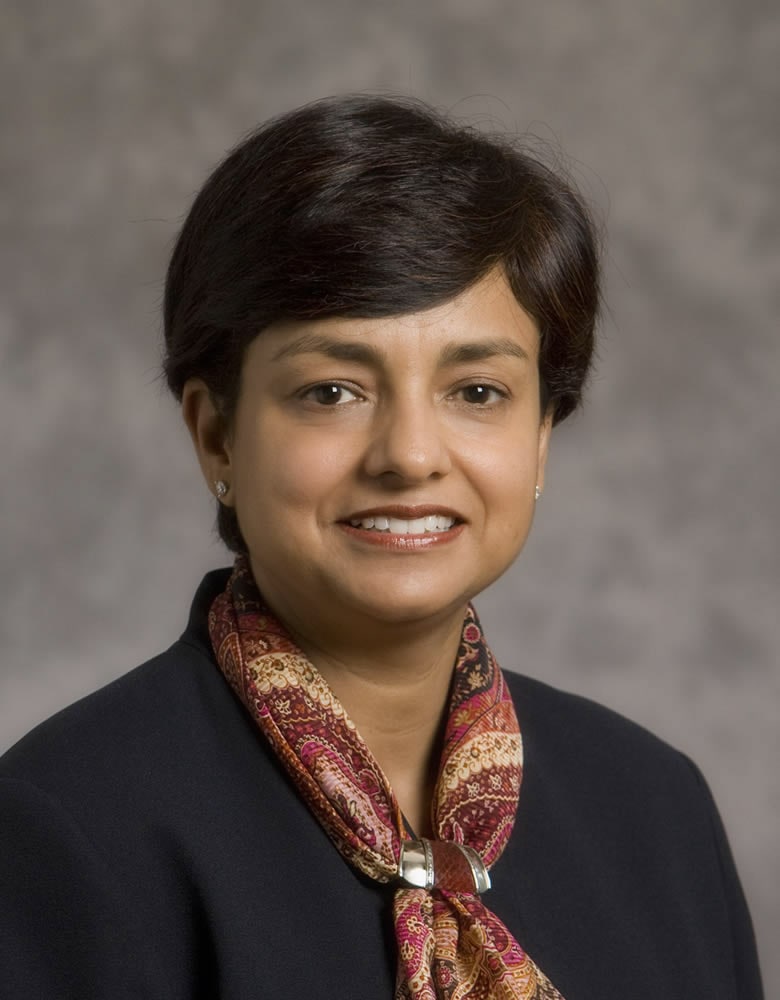
Manju Puri is the J. B. Fuqua Professor of Finance at the Fuqua School of Business, Duke University. She was earlier Associate Professor of Finance at Stanford Business School, which she joined after earning her Ph.D in finance at New York University and MBA from the Indian Institute of Management, Ahmedabad.
Professor Puri is an authority in the field of empirical corporate finance and has particular expertise in financial intermediation. Her published work spans the areas of commercial banks, investment banks, venture capital, entrepreneurship, behavioral finance, and FinTech. Her research has appeared in publications such as American Economic Review, Journal of Finance, Journal of Financial Economics, and Review of Financial Studies. She has been the recipient of the Sloan Research Fellowship as well as multiple awards from the National Science Foundation. Her publication record includes over 30 refereed papers in the top finance and economic journals. Her research has won many awards including four best paper awards at the FMA Annual Meetings, two Western Finance Association best paper awards, an All-Star award from Journal of Financial Economics, the Brennan best paper award at the Review of Financial Studies, and three Fama-DFA /Jenson best paper awards in the Journal of Financial Economics.
Professor Puri serves as Editor of Review of Financial Studies. She earlier served as Editor of the Journal of Financial Intermediation, as well as on the editorial boards of several journals including Journal of Finance, Journal of Money, Credit and Banking, Journal of Empirical Finance, Journal of Financial Research, and Journal of Financial Services Research. Professor Puri’s professional leadership roles include serving as Chair of the Academic Female Finance Committee (AFFECT), AFA, as a Director of the American Finance Association (AFA), and Vice-President Elect of the Western Finance Association. She has served as the President of the Financial Intermediation Research Society and as Director of the Financial Management Association. She is a senior academic fellow at the Asia Bureau of Finance and Economic Research. and a Research Associate with the National Bureau of Economic Research (NBER).
Raghuram Rajan
Raghuram Rajan is a Distinguished Service Professor of Finance at the Booth School. He was the 23rd Governor of the Reserve Bank of India between September 2013 and September 2016. Between 2003 and 2006, Dr. Rajan was the Chief Economist and Director of Research at the International Monetary Fund.
Dr. Rajan’s research interests are in banking, corporate finance, and economic development, especially the role finance plays in it. He co-authored Saving Capitalism from the Capitalists with Luigi Zingales in 2003. He then wrote Fault Lines: How Hidden Fractures Still Threaten the World Economy, for which he was awarded the Financial Times-Goldman Sachs prize for best business book in 2010.
Dr. Rajan is a member of the Group of Thirty. He was the President of the American Finance Association in 2011 and is a member of the American Academy of Arts and Sciences. In January 2003, the American Finance Association awarded Dr. Rajan the inaugural Fischer Black Prize for the best finance researcher under the age of 40. The other awards he has received include the Infosys prize for the Economic Sciences in 2012, the Deutsche Bank Prize for Financial Economics in 2013, Euromoney Central Banker Governor of the Year 2014, and Banker Magazine (FT Group) Central Bank Governor of the Year 2016.
Frank Reilly (1935 - 2021)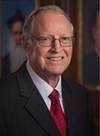
Frank K. Reilly is the Bernard J. Hank Professor of Finance at the University of Notre Dame. He is an expert in security analysis, capital markets, credit analysis, and security market indexes. Reilly teaches courses in applied investment management, capital budgeting, fixed income analysis, and investments, among others. He also has taught an executive course in bond analysis and credit management twice a year for nearly 30 years.
Honors and awards include University of Notre Dame Faculty Award (1999), which is the highest award given to faculty members; the Outstanding Teacher Award given by the MBA Class of 2004; the BP Foundation Outstanding Teacher Award (2002); and the Daniel J. Forrestal III Leadership Award for Professional Ethics and Standards of Investment Practice, given by the CFA Institute. Reilly also was inducted as a fellow of the Financial Management Association in its inaugural group (2000).
Jay Ritter
Since 1996, Jay R. Ritter has served as the Joseph B. Cordell Eminent Scholar in the Department of Finance at the University of Florida. He teaches corporate finance classes at the undergraduate, masters, and PhD level. Prof Ritter is known as “Mr. IPO” for his work on initial public offerings. During 2014-15, he is serving as president of the Financial Management Association. He received his BA, MA, and PhD (1981) degrees in economics and finance from the University of Chicago.
Richard Roll
Richard Roll holds the Joel Fried Chair in Applied Finance at UCLA Anderson. He is also a principal of the consulting firm, Compensation Valuation, Inc. Other business experience includes the Boeing Company where, in the early 1960's, he worked on the 727 and wrote the operating manual for the first stage booster of the Saturn moon rocket. During 1985-87, he was a vice-president of Goldman, Sachs & Co., where he founded and directed the mortgage securities research group. He has been a consultant for many corporations, law firms, and government agencies, and has served on several boards.
Prof. Roll was on the faculty at Carnegie-Mellon University, The European Institute for Advanced Study of Management in Brussels, and the French business school, Hautes Etudes Commerciales, near Paris. He joined the UCLA faculty in 1976.
He has published two books and more than 100 articles in peer-reviewed journals. His 1968 doctoral thesis won the Irving Fisher Prize as the best American dissertation in economics. He has won the Graham and Dodd Award for financial writing four times and the Leo Melamed Award for the best financial research by an American business school professor. Prof. Roll is the past president of the American Finance Association and is a fellow of the Econometric Society. He has been an associate editor of eleven different journals in finance and economics.
Antoinette Schoar 
Antoinette Schoar is the Stewart C. Myers-Horn Family Professor of Finance, MIT Sloan School of Management.
She holds a PhD in Economics from the University of Chicago and an undergraduate degree from Germany. Her research interests span from entrepreneurial finance to fintech, consumer finance, and financial intermediation. She has received several awards including the Kauffman Prize Medal for Distinguished Research in Entrepreneurship and the Brattle Prize for best paper in The Journal of Finance.
She is the co-chair of the NBER Corporate Finance group. She has served as an associate editor of The Journal of Finance, The American Economic Journal: Applied Economics, and the Journal of Economic Perspectives.
She also is the cofounder of ideas42, a non-profit organization that uses insights from behavioral economics and psychology to solve social problems.
Stephen Ross (1944 - 2017)
Stephen A. Ross is the Franco Modigliani Professor of Financial Economics and a Professor of Finance at the MIT Sloan School of Management. He was previously the Sterling Professor of Economics and Finance at Yale University and, before that, a professor of economics and finance at the Wharton School of the University of Pennsylvania. Ross is a co-founder and principal of Ross, Jeffrey & Antle LLC, an investment advisory firm specializing in using options to enhance the performance of institutional portfolios.
Ross is the author of more than 100 articles in economics and finance and is the coauthor of an introductory textbook in finance. He is probably best known for having invented the Arbitrage Pricing Theory and the Theory of Agency, and as the co-discoverer of risk-neutral pricing and of the binomial model for pricing derivatives. Models developed by Ross and his co-workers, including term structure models and option pricing models, are now standards for pricing in major securities trading firms. More recently, Ross has discovered the Recovery Theorem, which enables the extraction or “recovery” from options prices the market’s probability distribution for future returns.
He has been the recipient of numerous prizes and awards, including the 2015 Deutsche Bank Prize in Financial Economics, the 2012 Onassis Prize for Finance, the Graham and Dodd Award for financial writing, the Pomerance Prize for excellence in the area of options research, the University of Chicago’s Leo Melamed Prize for the best research by a business school professor, and the 1996 IAFE Financial Engineer of the Year Award. In 2006, he was the first recipient of the CME-MSRI Prize in Innovative Quantitative Application, and in 2007 he won the Jean-Jacques Laffont Prize given by the Toulouse School of Economics. Ross is a Fellow of the Econometric Society and a member of the American Academy of Arts and Sciences.
Ross has been president of the American Finance association and a consultant to a number of investment banks and major corporations. He has served as an advisor to government departments such as the U.S. Treasury, the Commerce Department, the Internal Revenue Service, and the EXIM Bank. He served as chairman of the American Express Advisory Panel and as director of General Re, Freddie Mac and CREF. He is currently a senior trustee of the California Institute of Technology (CalTech) and serves as an associate editor of several economics and finance journals. He holds a BS in physics from CalTech and a PhD in economics from Harvard University.
David Scharfstein
David Scharfstein is the Edmund Cogswell Converse Professor of Finance and Banking at Harvard Business School. He is also the Chair of Doctoral Programs at Harvard Business School and Chair of the Business Economics Ph.D. program. He teaches the MBA course, Managing the Financial Firm, as well as the Ph.D. course, Corporate Finance and Banking. Scharfstein has published on a broad range of topics in finance, including corporate investment and financing behavior, risk management, financial distress, capital allocation, and venture capital. His current research focuses on financial intermediation and financial regulation, including research on housing finance, financial system risk, the growth of the financial sector, and government risk management. Scharfstein is a Research Associate of the National Bureau of Economic Research, a member of the Financial Advisory Roundtable of the Federal Reserve Bank of New York, and President-Elect of the American Finance Association. During 2009-2010, he was Senior Advisor to the U.S. Treasury Secretary, working on policy related to the financial crisis. From 1987- 2003 he was a member of the finance faculty of the MIT Sloan School of Management. Scharfstein received a Ph.D. in Economics from MIT in 1986 and an A.B. from Princeton University in 1982.
Myron Scholes
Myron Scholes is the Frank E. Buck Professor of Finance, Emeritus, at the Stanford Graduate School of Business, Nobel Laureate in Economic Sciences, and co-originator of the Black-Scholes options pricing model. Scholes was awarded the Nobel Prize in 1997 for his new method of determining the value of derivatives. Scholes is currently the Chairman of the Board of Economic Advisers of Stamos Partners. Previously he served as the Chairman of Platinum Grove Asset Management and on the Dimensional Fund Advisors Board of Directors, American Century Mutual Fund Board of Directors and the Cutwater Advisory Board. He was a principal and Limited Partner at Long-Term Capital Management, L.P. and a Managing Director at Salomon Brothers. Other positions Scholes held include the Edward Eagle Brown Professor of Finance at the University of Chicago, Senior Research Fellow at the Hoover Institution, Director of the Center for Research in Security Prices, and Professor of Finance at MIT’s Sloan School of Management. Scholes earned his PhD at the University of Chicago.
Eduardo Schwartz
During Professor Eduardo Schwartz’ nearly 30 years at UCLA Anderson, he has authored well over 100 papers, publications whose quality is matched only by the wide variety of subjects he has studied. An expert in various dimensions of asset and securities pricing, Schwartz has at various times focused on pricing internet companies, interest rate models, asset allocation issues, evaluating natural resource investments, the stochastic behavior of commodity prices and valuing patent-protected R&D projects. His collected works include more 100 than articles in finance and economic journals, two monographs and a large number of monograph chapters, conference proceedings and special reports.
He is among the first researchers to develop the real options method of pricing investments under uncertainty. He is co-editor, with Lenos Trigeorgis of the University of Cyprus, on the book Real Options and Investment Under Uncertainty (MIT, 2001), a compilation of recent papers and classic research in the field. “I began my academic career with a degree in engineering,” says Schwartz, who earned his bachelor’s degree in his native Chile. “My work since has been rooted in mathematical modeling and an interest in stochastic modeling and uncertainty.”
In 2015, Schwartz was named International Association for Quantitative Finance (IAQF)/SunGard Financial Engineer of the Year in recognition of his individual contributions to the advancement of quantitative finance.
Schwartz is the winner of a number of awards for both teaching excellence and the quality of his published work. He has served as associate editor for more than a dozen journals, including Journal of Finance, Journal of Financial Economics and Journal of Financial and Quantitative Analysis. He is a former president of the Western Finance Association and the American Finance Association. He is a fellow of the American Finance Association and the Financial Management Association International. He is also a research associate of the National Bureau of Economic Research.
Schwartz was awarded a Doctor Honoris Causa by the University of Alicante in Spain and by the Copenhagen Business School. He also received the 2000 Graham and Dodd Award for his paper “Rational Pricing of Internet Companies,” published in the Financial Analysts Journal. He has been a consultant to governmental agencies, banks, investment banks and industrial corporations.
G William Schwert
Bill Schwert is a Distinguished University Professor of Finance and Statistics at the University of Rochester's William E. Simon Graduate School of Business Administration. He came to Rochester in 1976, after spending the 1975-76 academic year at the University of Chicago as an Assistant Professor of Finance. He received his A.B. with honors in economics from Trinity College in Hartford, Connecticut in 1971, his M.B.A. in 1973 and his Ph.D. in 1975 both from the University of Chicago.
Bill has been a Research Associate of the National Bureau of Economic Research since 1988. He was the Chair of the Business and Economics Section of the American Statistical Association in 1990, and from 1987-89 he was a Director of the American Finance Association. He has been one of the Editors of the Journal of Financial Economics since 1979. Since 1996, Bill has been the Managing Editor of the JFE. He was an Associate Editor of the Journal of Finance from 1983-2000 and he has been an Advisory Editor for the Journal of Monetary Economics. He also edits the Journal of Financial Abstracts: Series C, Capital Markets and co-edits (with Rene M. Stulz) the Journal of Financial Abstracts: Series B, Banking and Financial Institutions, both for the Financial Economics Network. Bill serves on the Advisory Board of the Journal of Applied Corporate Finance and of the Financial Economics Network. He is a co-founder of Knollwood Consulting Group, Inc., an economic and financial consulting firm.
Lemma Senbet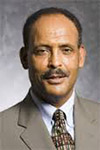
Lemma W. Senbet is the William E. Mayer Chair Professor of Finance at the Smith School of the University of Maryland, College Park and Director of the Center for Financial Policy. He is also the incoming Executive Director of the African Economic Research Consortium (AERC). He has been an influential member of the global community of finance scholars for over 30 years. His chief research interests are in the areas of corporate finance, international finance, agency, and financial contracting. He has advised the World Bank, the International Monetary Fund, the United Nations, African Economic Research Consortium, and other international institutions on issues of financial sector reform and capital market development. He also served as an independent director for The Fortis Funds and currently is an independent director for The Hartford Funds.
Professor Senbet is internationally recognized for his widely cited contributions to finance, which have appeared in such leading academic journals as the Journal of Finance, Review of Financial Studies, and Journal of Business. He has published over sixty papers. The 1986 survey ranked him third among world-wide contributing authors to the Journal of Finance for the period 1976-1985. The 2005 Journal of Financial Literature survey cited him among the most prolific authors for a half century of contributions to the leading finance journals from 1953 – 2002 (ranked #26 among 5,811 world-wide contributing authors).
Professor Senbet served as Chair of the Finance Department at the Smith School from 1998 – 2006, and his tenure saw rapid transformation and growth of the Department into world class. Professor Senbet has trained numerous doctoral students who have gone on to faculty positions at major colleges and universities, including Carnegie Mellon, Dartmouth, Vanderbilt, Minnesota, Florida, Oregon, and Rutgers. In 1994, Senbet was awarded the Smith School’s Krowe Award for teaching excellence.
William Sharpe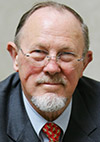
William F. Sharpe is the STANCO 25 Professor of Finance, Emeritus, at Stanford University’s Graduate School of Business. He joined the Stanford faculty in 1970, having previously taught at the University of Washington and the University of California at Irvine. In 1996, he cofounded Financial Engines, a firm that provides online investment advice and management for individuals.
Sharpe was one of the originators of the Capital Asset Pricing Model, developed the Sharpe Ratio for investment performance analysis, the binomial method for the valuation of options, the gradient method for asset allocation optimization, and returns-based style analysis for evaluating the style and performance of investment funds.
Sharpe has published articles in a number of professional journals, including Management Science, The Journal of Business, The Journal of Finance, The Journal of Financial Economics, The Journal of Financial and Quantitative Analysis, The Journal of Portfolio Management, and The Financial Analysts’ Journal.
He has also written seven books, including Portfolio Theory and Capital Markets (McGraw-Hill, 1970 and 2000), Asset Allocation Tools (Scientific Press, 1987), Fundamentals of Investments (with Gordon J. Alexander and Jeffrey Bailey, Prentice-Hall, 2000), Investments (with Gordon J. Alexander and Jeffrey Bailey, Prentice-Hall, 1999) and Investors and Markets, Portfolio Choices, Asset Prices and Investment Advice, Princeton University Press, 2007.
Sharpe is past president of the American Finance Association. In 1990 he received the Nobel Prize in Economic Sciences.
He received his PhD, MA and BA in Economics from the University of California at Los Angeles. He is also the recipient of a Doctor of Humane Letters, Honoris Causa from DePaul University, a Doctor Honoris Causa from the University of Alicante (Spain), a Doctor Honoris Causa from the University of Vienna (Austria), and the UCLA Medal, UCLA’s highest honor.
Andrei Shleifer
A Professor of Economics at Harvard University, Andrei Shleifer holds an undergraduate degree from Harvard and a Ph.D. from MIT. Before coming to Harvard in 1991, he has taught at Princeton and the Chicago Business School. Shleifer has worked in the areas of comparative corporate governance, law and finance, behavioral finance, as well as institutional economics. He has published six books, including The Grabbing Hand (with Robert Vishny), and Inefficient Markets: An Introduction to Behavioral Finance, as well as over a hundred articles. Shleifer is an Editor of the Quarterly Journal of Economics, and a fellow of the Econometric Society, the American Academy of Arts and Sciences, and the American Finance Association. In 1999, Shleifer won the John Bates Clark medal of the American Economic Association. According to RePEc, Shleifer is the most cited economist in the world.
Clifford Smith
Clifford Smith is currently chairman of the board of Home Properties, a multifamily real estate investment trust (REIT) with operations primarily along the East Coast of the United States, and was formerly chair of the compensation committee, chair of the governance committee, and lead director. Smith has served as president of the Risk Theory Society, president of the Financial Management Association National Honor Society, vice president for Global Services of the Financial Management Association International, vice president of the International Economics and Finance Society, a member of the board of advisors of the International Association of Financial Engineers, and a member of the board of directors of the Financial Management Association and the Southern Finance Association. Students in the Executive MBA Program have given him their Superior Teaching Award 21 times; students in the MBA Program have given him their Superior Teaching Award 16 times. In 2003, he received the FMA Fellows Award by the Financial Management Association International. He was named Distinguished Scholar by the Southern Finance Association in 2000, and Distinguished International Visiting Scholar by the British Accounting Association in 1991. In 1986, he was given the first Special Award for a Perfect Teaching Rating by the School, in 1983, he was chosen a University Mentor in recognition of his scholarship and teaching.
Robert Stambaugh
Robert Stambaugh is the Miller Anderson & Sherrerd Professor of Finance at the Wharton School of the University of Pennsylvania. He is a Fellow and former President of the American Finance Association, a Fellow of the Financial Management Association, and a Research Associate of the National Bureau of Economic Research. Professor Stambaugh has been the editor of the Journal of Finance, an editor of the Review of Financial Studies, an associate editor of those journals as well as the Journal of Financial Economics, and a member of the first editorial committee of the Annual Review of Financial Economics. He has published articles on topics including return predictability, asset pricing tests, portfolio choice, parameter uncertainty, liquidity risk, volatility, performance evaluation, investor sentiment, and active-versus-passive investing. His research awards include a Smith-Breeden first prize for an article in the Journal of Finance as well as a Fama-DFA first prize and three second prizes for articles in the Journal of Financial Economics. Before joining Wharton in 1988, he was Professor of Finance at the University of Chicago, where he received his PhD in 1981. Professor Stambaugh visited Harvard University as a Marvin Bower Fellow in 1997-98.
Laura Starks
Laura T. Starks Associate Dean for Research, Charles E. and Sarah M. Seay Regents Chair in Finance. She teaches undergraduate and graduate courses on environmental, social and governance investing, global financial strategies, and other finance topics. She was Chairman of the Department of Finance for 9 years. She was also an editor of the Review of Financial Studies from 2008-2014 and has won a number of research and teaching awards in her career. Her current research focuses on mutual funds, corporate governance institutional investors and environmental, social and governance investing. She has served on the Board of Directors of the four national academic finance organizations: the American Finance Association, the Financial Management Association (FMA), the Society of Financial Studies (SFS) and the Western Finance Association (WFA). She is past president of the FMA and is currently Vice-President of the SFS, and President-Elect of the WFA. She is a past Chairman of the Graduate Assembly for the University of Texas at Austin, the elected faculty council that governs the University’s graduate programs, and served on the Executive Committee of the University Faculty Council. She is an independent director for CREF Retirement Accounts and TIAA-CREF Mutual Funds, serves on the Investment Advisory Committee for the Employees Retirement System of Texas, the Board of Governors of the Investment Company Institute, and the Governing Council of the Independent Directors Council. She has also served on the 2013 Strategy Council and the 2014 Expert Panel for the Norwegian Government Pension Fund (the largest sovereign wealth fund in the world).
Jeremy Stein
Jeremy C. Stein is the Moise Y. Safra Professor of Economics at Harvard University, where he teaches courses in the undergraduate and PhD programs, and serves on the board of directors of the Harvard Management Company. From May 2012 to May 2014, he was a member of the Board of Governors of the Federal Reserve System.
Before coming to Harvard in 2000, Stein was on the finance faculty of M.I.T.’s Sloan School of Management for ten years, most recently as the J.C. Penney Professor of Management. Prior to that, he was an assistant professor of finance at the Harvard Business School from 1987-1990. He received his AB in economics summa cum laude from Princeton University in 1983 and his PhD in economics from M.I.T. in 1986.
Stein’s research has covered such topics as: behavioral finance and market efficiency; corporate investment and financing decisions; risk management; capital allocation inside firms; banking; financial regulation; and monetary policy. He has been a co-editor of the Quarterly Journal of Economics, and the Journal of Economic Perspectives, and on the editorial boards of several other economics and finance journals.
Stein is a fellow of the American Academy of Arts and Sciences, a research associate at the National Bureau of Economic Research, and a past member of the Federal Reserve Bank of New York’s Financial Advisory Roundtable. In 2008, he was president of the American Finance Association. In 2009, he served as a senior advisor to the Treasury Secretary and on the staff of the National Economic Council.
René Stulz
René M. Stulz is the Everett D. Reese Chair of Banking and Monetary Economics and the Director of the Dice Center for Research in Financial Economics at The Ohio State University. He has also taught at the Massachusetts Institute of Technology, the University of Chicago, and the University of Rochester. He received his Ph.D. from the Massachusetts Institute of Technology. He was awarded a Marvin Bower Fellowship from the Harvard Business School, a Doctorat Honoris Causa from the University of Neuchâtel, and the Risk Manager of the Year Award of the Global Association of Risk Professionals. In 2004, the magazine Treasury and Risk Management named him one of the 100 most influential people in finance. Reuters includes him in its list of the world’s most influential scientific minds. He is a past president of the American Finance Association and of the Western Finance Association, and a fellow of the American Finance Association, the European Corporate Governance Institute, the Financial Management Association, and the Wharton Financial Institutions Center.
René M. Stulz was the editor of the Journal of Finance, the leading academic publication in the field of finance, for twelve years. He is on the editorial board of more than ten academic and practitioner journals. Further, he is a member of the Asset Pricing and Corporate Finance Programs and the director of the Risk of Financial Institutions Group of the National Bureau of Economic Research.
He has published more than one hundred papers in finance and economics journals, including the Journal of Political Economy, the Quarterly Journal of Economics, the Journal of Financial Economics, the Journal of Finance, the Review of Financial Studies, and the Harvard Business Review. He is the author of a textbook titled Risk Management and Derivatives, a co-author of the Squam Lake Report: Fixing the Financial System, and has edited several books, including two volumes of the Handbook of the Economics of Finance.
René M. Stulz has taught in executive development programs in the U.S., Europe, and Asia. He has consulted for major corporations, law firms, the New York Stock Exchange, the IMF, and the World Bank. He is a director of Banque Bonhote and a member of the Board of Trustees of the Global Association of Risk Professionals. At GARP, he also chairs the FRM committee that oversees the FRM certification examination.
Sheridan Titman
Sheridan Titman is a professor in the Department of Finance who holds the Walter W. McAllister Centennial Chair in Financial Services. He is also the director of the Energy Management and Innovation Center at UT. Dr. Titman took his Ph.D. at Carnegie Mellon University. His research interests include both investments and corporate finance.
Donald Tuttle (1934 - 2023)
Donald L. Tuttle, PhD, CFA, is Senior Advisor and Director of CastlePoint Investment Group, LLC. He is a former member of the Board of Trustees of Bank One’s One Group mutual funds where he was a trustee of over 100 mutual funds, the Board of the American Red Cross Retirement System, the Board of the College for Financial Planning and the Board of the Federal Home Loan Bank of Indianapolis.
He is retired Vice President of CFA Institute, which awards the Chartered Financial Analysis designation to professional security analysts and portfolio managers. He received his BSBA and MBA from the University of Florida and his PhD from the University of North Carolina at Chapel Hill. He previously taught at Indiana University for 21 years where he chaired the Finance Department from 1970 to 1980. Dr. Tuttle was Vice President, Trust and Investment Advisors, Inc., a registered investment advisor, in 1990-91. He is the author or editor of six books, including the third edition of Managing Investment Portfolios: A Dynamic Process (2007), and numerous articles in leading finance journals. He is a member of the Advisory Board of The Journal of Portfolio Management.
Dr. Tuttle is a former President, Vice President and Executive Director of the Financial Management Association and a former Associate Editor of The Journal of Finance and Financial Management. He is also a former member of the CFA Digest Editorial Board and the CFA Institute’s predecessor Board of Trustees, Candidate Curriculum Committee, and Council of Examiners. In addition, he received the Institute’s C. Stewart Sheppard Award (1990) and its Alfred C. Morley Distinguished Service Award (2005). In 2000, Dr. Tuttle was designated an FMA Fellow by the Financial Management Association. In 2001, CFA Institute established the Donald L. Tuttle Award for Excellence in CFA Examination Grading and Dr. Tuttle was among the first award recipients. He is married and has two children.
 Ralph Walkling
Ralph Walkling
Dr. Walkling is internationally known for his research involving corporate governance and corporate acquisitions and for his ability to communicate financial concepts with clarity and in an exciting, effective fashion. He is a regular consultant to industry and a leading contributor to the top refereed journals in his field including The Journal of Financial Economics, The Journal of Finance, The Journal of Financial and Quantitative Analysis and The Rand Journal of Economics.
Dr. Walkling has been listed in the top 1% of more than twelve thousand finance authors in terms of academic citations to their work. He has received numerous awards for best papers in corporate finance and excellence in graduate teaching. Dr. Walkling currently serves as associate editor of The Journal of Financial and Quantitative Analysis, The Journal of Empirical Finance, The Journal of Applied Finance, and The Journal of Corporate Finance. He is a past associate editor of Financial Management. He is a member of the Board of Trustees and immediate Past President of the Financial Management Association, an international organization of over 7,000 academics and practitioners. Prior to joining Drexel, Dr. Walkling was Dean’s Research Professor of Finance in the Fisher College of Business at Ohio State University. He received his B.S. from Towson State University and his MBA and Doctorate from the University of Maryland.
As the founder and Executive Director of the Center for Corporate Governance at Drexel University, Dr. Walkling directs the Center’s advisory board comprised of leading area CEOs and executives. He has organized and moderated numerous conferences covering diverse issues such as rules of engagement for CEO and boards in the Sarbanes-Oxley era and corporate governance failures contributing to the subprime meltdown and subsequent lending crisis. In addition to his academic research Dr. Walkling writes a column for Directors and Boards magazine.
J Fred Weston (1916 - 2009)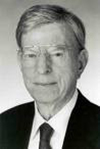
After completing doctoral studies at The University of Chicago, Professor Weston began teaching at UCLA in 1949. He led the school's finance area or business economics area for 28 years, from the late 1950s to the mid-1980s. Professor Weston has been chairman of doctoral committees for 32 Ph.D. students — a role he considers one of the most rewarding aspects of his academic career. Most of his Ph.D.s became tenured professors within five years after graduation. A number of them have become distinguished, with one of them, William Sharpe, winning the 1990 Nobel Memorial Prize in Economic Science.
Weston also served as director of UCLA Anderson's Research Program in Competition and Business Policy, which developed 192 publications and gave financial support to 39 students who completed their Ph.D. degree programs. This program developed models and empirical studies demonstrating that large firms were consistent with competition. In the early 1970s, the Research Program was among the first to publish research on the implications of the globalization of markets. In connection with these scholarly endeavors, Professor Weston was invited to testify before the Senate Judiciary Committee and related Congressional Committees at least once a year from 1953 through 1980.
Weston has been active in scholarly associations, having served as president of the American Finance Association, Western Economics Association, and the Financial Management Association. He served on the American Economics Association Consensus Advisory Committee during the 1970s. He has also been active in the National Association for Business Economics (NABE), of which he is a Fellow. NABE also honored Weston in 1991 with The Abramson Award, which is given in recognition of the best article published in the Association's journal, Business Economics.
Luigi Zingales
Luigi Zingales' research interests span from corporate governance to financial development, from political economy to the economic effects of culture. He co-developed the Financial Trust Index, which is designed to monitor the level of trust that Americans have toward their financial system. In addition to holding his position at Chicago Booth, Zingales is currently a faculty research fellow for the National Bureau of Economic Research, a research fellow for the Center for Economic Policy Research, and a fellow of the European Governance Institute. He is also an editorialist for Il Sole 24 Ore, the Italian equivalent of the Financial Times. Zingales also serves on the Committee on Capital Markets Regulation, which has been examining the legislative, regulatory, and legal issues affecting how public companies function. In 2014 he was the President of the American Finance Association.
In July 2015 he became the director of the Stigler Center at the University of Chicago which he is refocusing on promoting and diffusing research on regulatory capture and the various distortions that special interest groups impose on capitalism.
Born in Italy, Zingales carries with him a civic passion and the belief that economists should not just interpret the world, they should change it for the better. Commenting on his method of teaching on a few very important lessons rather than a myriad of details, Zingales says, "Twenty years from now they might have forgotten all the details of my course, but hopefully they will not have forgotten the way of thinking." Zingales received a bachelor's degree in economics summa cum laude from Università Bocconi in Italy in 1987 and a PhD in economics from the Massachusetts Institute of Technology in 1992. He joined the Chicago Booth faculty in 1992.
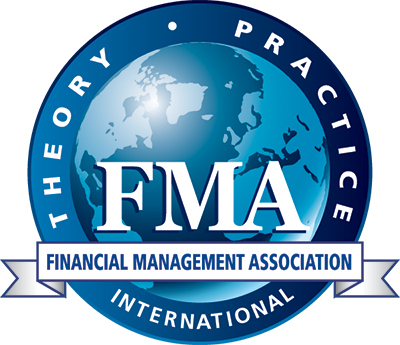
 Franklin Allen
Franklin Allen Edward Altman
Edward Altman Victor Andrews (1930 - 2024)
Victor Andrews (1930 - 2024)

























 Ravi Jagannathan
Ravi Jagannathan
 Wei Jiang
Wei Jiang



































 Ralph Walkling
Ralph Walkling
